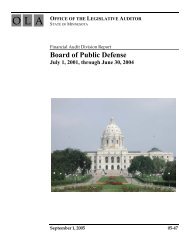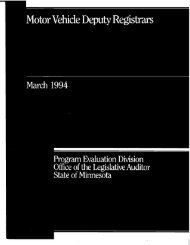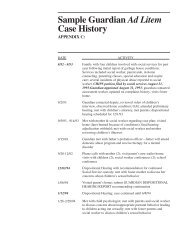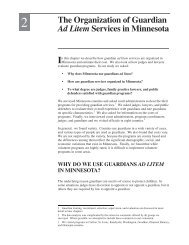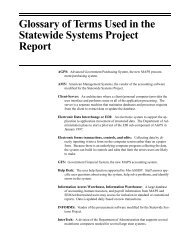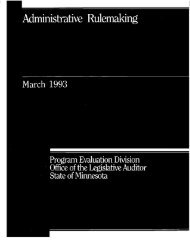Occupational Regulation - Office of the Legislative Auditor
Occupational Regulation - Office of the Legislative Auditor
Occupational Regulation - Office of the Legislative Auditor
Create successful ePaper yourself
Turn your PDF publications into a flip-book with our unique Google optimized e-Paper software.
APPENDIX B 99<br />
<strong>the</strong> board’s role because pr<strong>of</strong>essionals expect <strong>the</strong> board to lobby for <strong>the</strong> pr<strong>of</strong>ession<br />
ra<strong>the</strong>r than protect <strong>the</strong> public.<br />
REAL ESTATE APPRAISERS<br />
During <strong>the</strong> 1997 legislative session <strong>the</strong> Department <strong>of</strong> Commerce Omnibus Bill,<br />
H.F. 1032/S.F. 501, included a provision to change <strong>the</strong> licensing requirement <strong>of</strong><br />
real estate appraisers by increasing <strong>the</strong> training requirements for two classes <strong>of</strong><br />
licensees and reducing <strong>the</strong> requirement for <strong>the</strong> entry level appraiser.<br />
In 1997,<br />
legislation was<br />
enacted that<br />
brought<br />
Minnesota into<br />
conformity with<br />
national<br />
practice in<br />
regulation <strong>of</strong><br />
real estate<br />
appraisers.<br />
The Minnesota Association <strong>of</strong> Pr<strong>of</strong>essional Appraisers (MAPA) asked Commerce<br />
to sponsor this provision because <strong>the</strong> change was being made across <strong>the</strong> country in<br />
response to a recommendation by <strong>the</strong> national organization that sets pr<strong>of</strong>essional<br />
credentials and standards for practice. The need for national standards dates from<br />
<strong>the</strong> 1970s when mortgages started to be traded in <strong>the</strong> secondary market and a need<br />
was defined for uniform appraisal standards. The Minnesota legislation was <strong>the</strong><br />
culmination <strong>of</strong> a long process nationally and locally.<br />
Once <strong>the</strong> Commerce Department agreed with <strong>the</strong> Minnesota Association <strong>of</strong><br />
Pr<strong>of</strong>essional Appraisers that a change in licensing and continuing education<br />
requirements was needed in order to bring Minnesota into conformity with<br />
national standards, <strong>the</strong> legislative proposal was not controversial. Commerce did<br />
not agree with MAPA’s request to establish increased requirements for entry level<br />
appraisers because it restricted access to <strong>the</strong> occupation. MAPA was willing to<br />
drop that part <strong>of</strong> <strong>the</strong> proposal because it was not part <strong>of</strong> <strong>the</strong> national compact.<br />
Commerce argued against <strong>the</strong> proposal. MAPA chose to work through <strong>the</strong><br />
Department <strong>of</strong> Commerce and get its approval ra<strong>the</strong>r than approaching <strong>the</strong><br />
Legislature directly. This case is an example <strong>of</strong> <strong>the</strong> system working reasonably<br />
well in that policy issues were studied by Commerce, a satisfactory compromise<br />
was reached, and a needed change was made to licensure requirements.<br />
UNLICENSED MENTAL HEALTH<br />
PRACTITIONERS<br />
In Minnesota, a diverse group <strong>of</strong> practitioners <strong>of</strong>fer mental health services<br />
including unlicensed mental health practitioners. Unlike adjacent pr<strong>of</strong>essions<br />
such as clinical psychology, social work, and marriage and family counseling,<br />
unlicensed mental health practitioners are not licensed, registered, or certified, but<br />
<strong>the</strong>y are disciplined by <strong>the</strong> <strong>Office</strong> <strong>of</strong> Mental Health Practitioners (OMHP) in <strong>the</strong><br />
Department <strong>of</strong> Health if consumers or o<strong>the</strong>r pr<strong>of</strong>essionals file complaints. The<br />
investigation and disciplinary process is funded by general fund allocations. This<br />
is different than most o<strong>the</strong>r occupations which receive special fund allocations<br />
based on expected fee income. One <strong>of</strong> <strong>the</strong> potential benefits <strong>of</strong> this model is that<br />
it allows <strong>the</strong> department to collect statistics about complaints which could indicate<br />
whe<strong>the</strong>r <strong>the</strong> group needs a stronger form <strong>of</strong> regulation.



